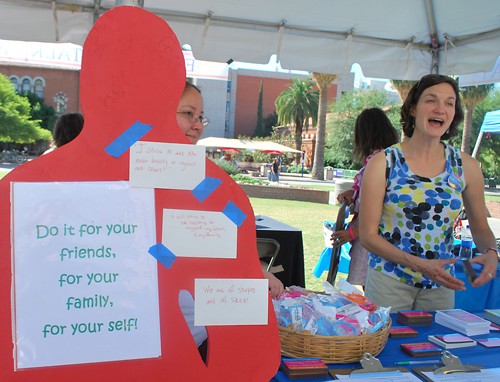Students pledged to ban body-bashing language during Fat Talk Free Day on Wednesday.
The UA Panhellenic Council collaborated with Campus Health Service and the Women’s Resource Center to promote healthy body image among students. An event on the Mall provided information about “”fat talk”” and a pledge for students to sign. Stacy Nadeau, who participated in the Dove Campaign for Real Beauty, gave a speech in the evening.
“”Fat talk”” includes personal criticism of one’s appearance or focusing on size rather than health.
“”They’re statements in casual conversation that reinforce it’s better to be thin,”” said Laura Orlich, a mental health clinician for Counseling and Psychological Services, who works with students with eating disorders. “”All of that goes to being dissatisfied with the bodies that we have.””
People can reinforce the “”thin ideal”” without calling someone fat.
“”Also, things like ‘Oh my gosh, you look great. Have you lost weight?'”” said journalism senior Mari Kelly, vice president of risk management for the UA Panhellenic Council.
Kelly worked with the other organizations to model the event after National Fat Talk Free Week, which is held annually by her sorority, Delta Delta Delta. Fat Talk Free Day was a Sorority Safe Night event, but was alos open to the community.
Kelly said “”fat talk”” is commonly used among college students.
“”It’s something that’s not addressed, unfortunately, as much as it should be,”” Kelly said.
Event organizers encouraged students to replace “”fat talk”” with positive statements and “”find other ways to give compliments,”” said Elizabeth Dake, a senior majoring in history and religious studies, an intern for the Women’s Resource Center.
“”Each person has their own healthy body,”” Dake said.
Pre-Nursing freshman Brianda Valdez learned the term “”fat talk”” at the event but was already familiar with the concept. She said people use the speech in day-to-day conversations.
“”Like when you eat a lot and say ‘I feel so fat,'”” Valdez said.
Valdez said she signed the pledge asking people to eliminate “”fat talk”” from their conversations to “”increase self-esteem.””
Biology sophomore Christina Bischoff said she regularly hears people use “”fat talk.””
“”I think pretty much all the women and men I know are constantly talking about how fat they are,”” Bischoff said.
Bischoff said she notices friends using “”fat talk”” when they are having a bad day or are disappointed about something unrelated.
“”I think fat is a state of mind for most people,”” Bischoff said.
She said she signed the pledge as a reminder to banish the language.
“”I know, for example, I try to be as body-affirming as possible, but once in awhile I find myself thinking, ‘That girl shouldn’t be wearing those shorts,'”” Bischoff said. “”It just pops out.””









